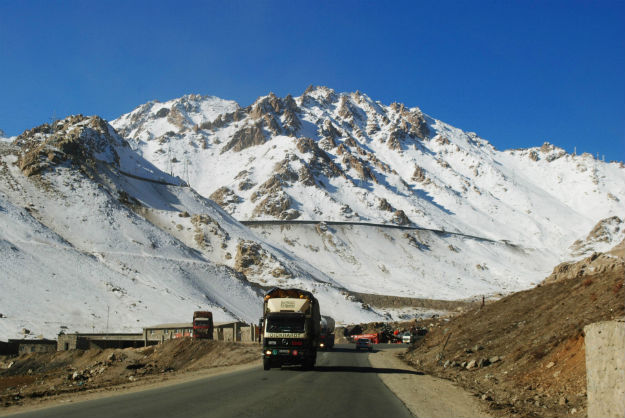
Moscow Fears Shift in Central Asia’s Strategic Balance Post-2014
Publication: Eurasia Daily Monitor Volume: 9 Issue: 119
By:

Moscow has reacted with concern after learning about the ongoing talks between Washington and three Central Asian countries aimed at agreeing on the handover of equipment linked to the NATO drawdown in Afghanistan. Russian officials fear that such equipment donations to the Armed Forces in Kyrgyzstan, Tajikistan and Uzbekistan not only go way beyond the existing arrangements to assist in reverse transit using the Northern Distribution Network (NDN) but could upset the strategic balance in Central Asia post-2014. In diplomatic circles in Moscow, this development is portrayed as entirely unacceptable to Russia and may indicate a worsening in US-Russian relations. A potential diplomatic crisis between Washington and Moscow is brewing precisely in this area due to a number of inter-related factors, but with President Vladimir Putin under pressure domestically he may choose to use this at some stage to boost his image at home by confronting the United States more directly (Kommersant, June 15).
US and UK efforts to promote reverse transit deals with the Central Asian states intensified in recent months, and during talks between London and Bishkek in late March the issue was raised by the Kyrgyzstani government about possible military equipment donations to Kyrgyzstan’s Armed Forces. British officials told Jamestown that they were reluctant to hand over assets that may give the Kyrgyzstani Armed Forces capabilities not possessed by neighboring countries. Washington also pursued similar talks in addition to NDN negotiations aimed at offering equipment from the International Security Assistance forces (ISAF) in Afghanistan to Kyrgyzstan, Tajikistan and Uzbekistan.
According to Kommersant, Moscow learned through its own channels that Washington has opened talks with Bishkek, Dushanbe and Tashkent concerning leaving some US military equipment behind and agreeing a handover and storage of other items on a bilateral basis. Kommersant’s Russian diplomatic interlocutors made clear that this was seen as taking place behind Russia’s back and is unacceptable. Moscow believes that Washington wants to provide military equipment free of charge and agree to store additional assets. The hardware referred to includes armored vehicles, transporters for tanks, tow trucks, fuel tankers, bulldozers and water carriers. Moreover, it would extend to medical equipment, communications facilities, fire equipment and mobile gyms to support the daily lives of the local military (Kommersant, June 15).
The article explored various rationales for US policy in this initiative, which also portrayed the plans in connection with Washington wanting to avoid the equipment falling into the hands of the Taliban should the Karzai government fall post-2014. The main objection to such plans, relates to an agreement reached between the members of the Collective Security Treaty Organization (CSTO) at the Moscow Summit in December 2011. The allies agreed that foreign military basing would require discussion and consensus among all CSTO member states, as would any large-scale re-equipping from a foreign source (Kommersant, June 15).
However, Moscow’s concerns run much deeper. It fears any move that may undermine its traditionally strong security ties with the Central Asian states, while also remaining anxious about future US military basing policy in the region. Deputy Foreign Minister Sergei Ryabkov has criticized Washington’s plans to maintain a military presence in Afghanistan and Central Asia after the completion of the NATO withdrawal from Afghanistan in 2014. On June 15, Ryabkov stated: “The prospect of maintaining an American military presence in Central Asia after the troop withdrawal from Afghanistan concerns us. It is not clear to us why the US must keep their bases if the responsibility (for ensuring security) will be delegated to the Afghan forces” (RIA Novosti, June 15).
Similarly, on March 21, Russian Foreign Minister Sergei Lavrov sounded a warning about US basing policy post-2014: “The establishment of several major military bases in Afghanistan without any deadlines and without any clearly declared goals surely causes questions. These plans are not only limited to the establishment of bases in Afghanistan: the Americans are also actively seeking to acquire more military facilities in Central Asian countries for the long term. We want to understand the goals of this presence” (Interfax, March 21).
Lavrov referred to the fear commonly expressed in Russian security parlance linked to the appearance or strengthening of foreign military infrastructure close to the country’s territory. This anxiety is also enshrined in the 2010 Military Doctrine and clearly refers to US and NATO infrastructure moving closer to Russia’s borders (www.scfr.ru, February 5, 2010).
Russia’s Defense Minister Anatoliy Serdyukov, Deputy Defense Minister Anatoliy Antonov and the Chief of the Russian General Staff Army-General Nikolai Makarov have declared as an objective of state security policy strengthening stability in Central Asia by making the CSTO a genuinely combat-ready organization, capable of repelling existing and future threats (RIA Novosti, April 24, 2011; Interfax AVN, March 13, 2011; Interfax AVN, November 17, 2011).
Moscow also refers to the agreement reached during the CSTO Moscow summit on December 20, 2011 making it necessary to achieve agreement by all members before any CSTO country agrees to host a foreign military base. This clause effectively gives Moscow the right to veto any new base in Central Asia. At a political level, CSTO members also agreed to coordinate their stances on various foreign policy issues, and this can already be seen by Moscow’s allies issuing negative statements on US missile defense plans (Interfax AVN, December 20, 2011; www.odkb.gov.ru, December 20, 2011).
However, there is a distinction between real security fears and Moscow’s penchant to cluster a number of international security developments together in order to boost its own security agenda in Central Asia. By persistently referring to the Arab Spring, changes in the security environment and the possibly negative impact of the NATO withdrawal from Afghanistan, Moscow seeks to enhance and justify its efforts to boost the CSTO. In this regard there are Russian defense industry interests at stake, particularly by securing a long term near monopoly on the sale of weapons and equipment to its Central Asian allies. During the past two years, Russian officials claim that Moscow has sold $500 million in military hardware to CSTO members (www.lenta.ru, April 12).
Although the US or ISAF military hardware that may be donated to Kyrgyzstan, Tajikistan and Uzbekistan is not intended to change the regional military balance, Moscow is appealing to fears within the region concerning the motives behind this shift in US policy. Meanwhile, Moscow is trying to remind its Central Asian allies that mechanisms already exist, which give Russia a powerful voice in its neighbors’ foreign arms purchasing decisions; yet, the ultimate decision on how this plays out lies in the hands of Vladimir Putin.




